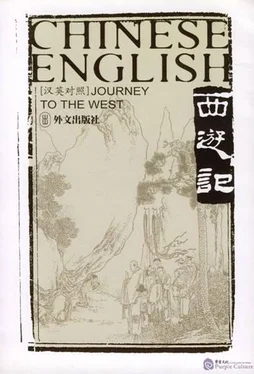The Great Sage jumped up, shook himself, put the hairs back, and gave Friar Sand these instructions: “You are a good man, my brother, so mind you stop Pig from talking nonsense and be very careful on the journey. If at any time evil spirits capture our master, you tell them that I'm his senior disciple. The hairy devils of the West have heard of my powers and won't dare to harm him.”
“I am a good monk,” said the Tang Priest, “and I'd never mention the name of a person as bad as you. Go back.” As his master refused over and over again to change his mind Monkey had nothing for it but to go. Look at him:
Holding back his tears he bowed good-bye to his master,
Then sadly but with care he gave instructions to Friar Sand.
His head pushed the hillside grass apart,
His feet kicked the creepers up in the air.
Heaven and earth spun round like a wheel;
At flying over mountains and seas none could beat him.
Within an instant no sign of him could be seen;
He retraced his whole journey in a flash.
Holding back his anger, Monkey left his master and went straight back to the Water Curtain Cave on the Mountain of Flowers and Fruit on his somersault cloud. He was feeling lonely and miserable when he heard the sound of water. When he looked around from where he was in midair, he realized that it was the waves of the Eastern Sea. The sight of it reminded him of the Tang Priest, and he could not stop the tears from rolling down his cheeks. He stopped his cloud and stayed there a long time before going. If you don't know what happened when he went, listen to the explanation in the next installment.
On the Mountain of Flowers and Fruit the Devils Rise
Sanzang Meets a Monster in the Black Pine Forest
The Great Sage was gazing at the Eastern Ocean, sighing sadly at being driven away by the Tang Priest. “I haven't been this way for five hundred years,” he said. As he looked at the sea,
Vast were the misty waters,
Boundless the mighty waves.
The vast and misty waters stretched to the Milky Way;
The boundless and mighty waves were linked to the earth's arteries.
The tides came surging,
The waters swirled around.
The surging tides
Roared like the thunder in spring;
The swirling waters
Howled like a summer hurricane.
The blessed ancients riding on dragons
Surely must have frowned as they came and went;
Immortal youths flying on cranes
Certainly felt anxious as they passed above.
There were no villages near the coast,
And scarcely a fishing boat beside the sea.
The waves' crests were like immemorial snows;
The wind made autumn in July.
Wild beasts roamed at will,
Shore birds bobbed in the waves.
There was no fisherman in sight,
And the only sound was the screaming of the gulls.
Though the fish were happy at the bottom of the sea,
Anxiety gripped the wild geese overhead.
With a spring Monkey leapt over the Eastern Ocean and was soon back at the Mountain of Flowers and Fruit. As he brought his cloud down and gazed around him, he saw that all the vegetation on the mountain had gone and the mists had disappeared completely. The peaks had collapsed and the woods were shriveled and dead. Do you know why? It was because when Monkey was taken to the upper world after wrecking the Heavenly Palace, the god Erlang and the Seven Brothers of Meishan had burnt it all down. This made the Great Sage even more miserable than ever. There is a poem in the ancient style about the ruined landscape of the mountain:
I came back to the immortal mountain in tears;
On seeing it, my sorrow is doubled.
I used to think that it was safe from harm,
But now I know that it has been destroyed.
If only Erlang had not defeated me;
Curse you for bullying me like that.
I shall dig up the graves of your ancestors,
And not stop at destroying their tombs.
Gone, gone, the mists that filled the sky;
Scattered the winds and clouds that covered the earth.
On the Eastern ridge the tiger's roar is silent.
The ape's howl no more on the Western mountain.
No sign of hare or fox in the Northern valley;
No shadow of a deer in the Southern ravine.
The blue rock was burnt to a thousand cinders,
The jade-green sands are now just mud.
The lofty pines outside the cave all lean askew;
Few are the cypresses before the cliff.
Cedar, fir, locust, chestnut, juniper, and sandalwood-all are burnt.
Peach, apricot, plum, pear, and jujube-gone every one.
How are the silkworms to be fed without oak and mulberry?
The birds cannot nest with no willow or bamboo.
The crags and boulders have been turned to dust,
The springs have dried up, and weeds grow in the stream-beds.
The earth is black in front of the cliff, and no orchids grow.
Creepers crawl in the brown mud by the path.
Where did the birds of yesterday fly?
To what other mountain did the animals go?
Leopards and pythons dislike this ruined spot;
Cranes and snakes avoid the desolation.
My criminal thoughts of those days past
Brought on the disaster of today.
The Great Sage, deep in gloom, heard a sound from a thorny hollow in front of a grassy slope as seven or eight little monkeys leapt out, rushed up to him, and surrounded him kowtowing. “Great Sage,” they shouted, “have you come home today?”
“Why aren't you playing?” the Handsome Monkey King asked them. “Why were you all hiding? I was here for ages without seeing a sign of you. Why?”
Tears poured from the eyes of the other monkeys as they told him, “Ever since you were taken up to Heaven as a prisoner, Great Sage, the hunters have given us a terrible time. What with their powerful bows and crossbows, their brown falcons and evil hounds, their nets, loops, hooks, and spears, we are all too afraid for our lives to come out and play. We have to hide deep in our caves and keep away from our usual dens. When we're hungry we filch some grass from the hillside, and we drink the fresh spring water from the stream. We've only just heard you, Great Sage, Your Majesty, and come out to greet you. Please, please help us.”
The Great Sage felt more depressed than ever on hearing this, and he went on to ask, “How many of you are there left on this mountain?”
“Only about a thousand of all ages.”
“In the old days,” said the Great Sage, “I had forty-seven thousand fiends. Where have they all gone now?”
“After you went away the god Erlang set fire to the mountain and most of us were killed in the blaze. Some of us squatted at the bottom of wells, or hid in gullies, or took cover under the iron bridge, and escaped with our lives. When the fire burnt itself out and the smoke cleared we came out to find that there were no more plants or fruit to feed us, making life almost impossible, so half of the survivors went away. The rest of us have been having a very lean time on this mountain, and half of those left have been caught by hunters in the past two years.”
“What do they do that for?” Monkey asked.
“We hate the very name 'hunters,'“ the other monkeys replied. “They shoot us with arrows, spear us, poison us, and beat us to death. They take us away to skin us and cut the flesh from our bones before boiling us in soy sauce, steaming us with vinegar, frying us in oil, or stir-cooking us with salt. Then they eat us to help their rice down. Those of us who are caught in nets or loops are taken away alive and made to dance in a ring, act, do somersaults, jump around, play drums and gongs in the street, and make fools of themselves in every possible way.”
“Who's in charge in the cave?” asked Monkey, now thoroughly angry.
Читать дальше









